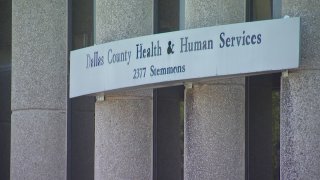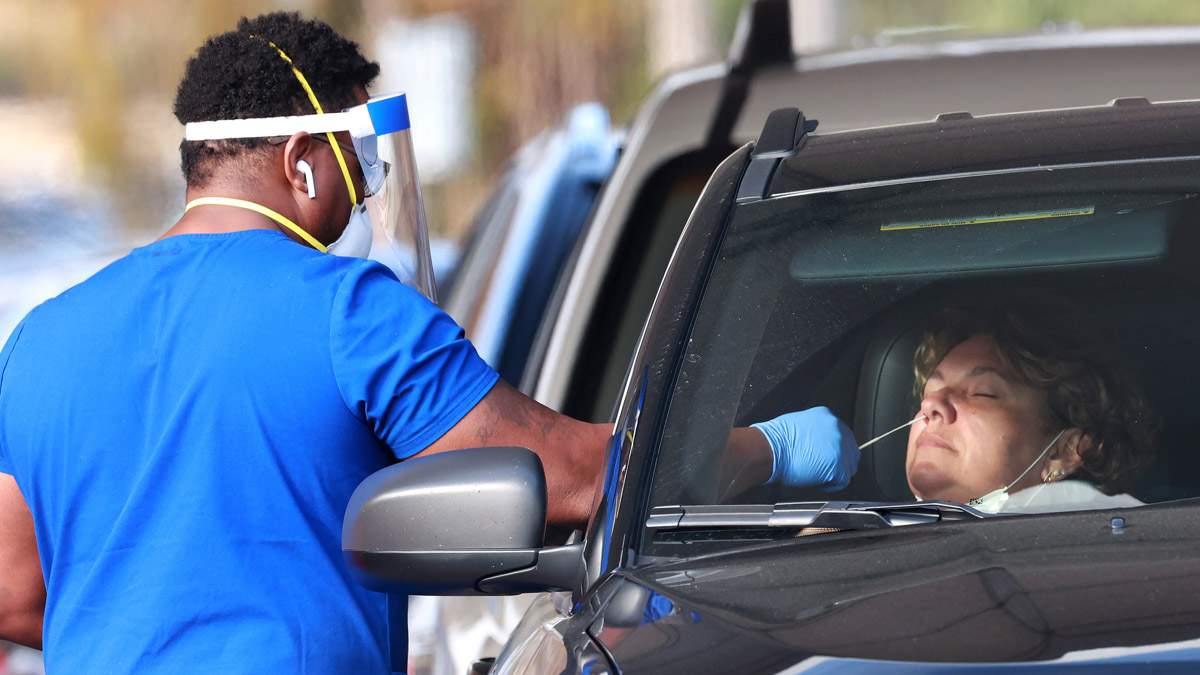
Dallas County is reporting 1,589 new COVID-19 cases, 16 more deaths, and nearly 1,200 people currently hospitalized and battling the virus in the county Tuesday.
The county said 1,160 COVID-19 patients in county hospitals through Monday night. They also reported 505 ER visits Monday for people with COVID-19 symptoms. On Tuesday, Dallas County Judge Clay Jenkins tweeted there were 26 adult ICU beds available as of Jan. 18.
"Today we report 1,589 new COVID cases and 16 additional deaths. Updated modeling from UT Southwestern predicts that Dallas County could have up to 1,440 hospitalized COVID patients and 2,700 new daily COVID cases by Jan. 29," Dallas County Judge Clay Jenkins. "In addition, they show that physical distancing, mask-wearing and other prevention measures have decreased transmission of COVID-19 about 65%. This is encouraging, but we must remain vigilant in our efforts to stop and slow the spread of this virus since they also show that hospitalizations have increased 53% compared to one month ago. We must continue to follow the doctors’ recommendations to best protect ourselves, our loved ones and our community."
Get DFW local news, weather forecasts and entertainment stories to your inbox. Sign up for NBC DFW newsletters.
Of the cases reported Tuesday, the county said 1,351 were confirmed cases and 238 were probable (antigen test) cases, bringing the total number of confirmed cases in the county from March 2020 to 208,991 and the number of probable (antigen test) cases to 27,223. The total of confirmed and probable cases in the county is now at 236,214. Over the last seven reporting days, Dallas County officials have announced 17,128 new confirmed and probable cases of the virus for an average of 2,309 per day.
County officials said Tuesday there have been 1,887 deaths in the county attributed to the virus since March 2020. The 16 victims announced Tuesday included a man in his 40s and a woman in her 80s.
- A man in his 40s who was a resident of the City of Irving. He had been critically ill in an area hospital and had underlying high-risk health conditions.
- A woman in her 50s who was a resident of the City of Mesquite. She had been hospitalized and had underlying high-risk health conditions.
- A man in his 50s who was a resident of the City of Dallas. He had been critically ill in an area hospital and had underlying high-risk health conditions.
- A man in his 50s who was a resident of the City of Dallas. He had been critically ill in an area hospital and had underlying high-risk health conditions.
- A woman in her 60s who was a resident of a long-term care facility in the City of Richardson. She had been critically ill in an area hospital and did not have underlying high-risk health conditions.
- A woman in her 60s who was a resident of the City of Hutchins. She had been critically ill in an area hospital and had underlying high-risk health conditions.
- A woman in her 60s who was a resident of the City of Dallas. She had been critically ill in an area hospital and did not have underlying high-risk health conditions.
- A man in his 60s who was a resident of the City of Dallas. He had been hospitalized and had underlying high-risk health conditions.
- A woman in her 70s who was a resident of the City of Dallas. She had been critically ill in an area hospital and had underlying high-risk health conditions.
- A man in his 70s who was a resident of the City of Garland. He had been critically ill in an area hospital and had underlying high-risk health conditions.
- A woman in her 70s who was a resident of the City of Dallas. She had been critically ill in an area hospital and had underlying high-risk health conditions.
- A man in his 80s who was a resident of the City of Grand Prairie. He had been critically ill in an area hospital and had underlying high-risk health conditions.
- A woman in her 80s who was a resident of the City of Dallas. She had been critically ill in an area hospital.
- A man in his 80s who was a resident of a long-term care facility in the City of Garland. He had been critically ill in an area hospital and had underlying high-risk health conditions.
- A man in his 80s who was a resident of the City of Grand Prairie. He expired in hospice and had underlying high-risk health conditions.
- A woman in her 80s who was a resident of the City of Dallas. She had been hospitalized.
COVID-19 VACCINE EFFORTS
In partnership with the state health department, Dallas County opened a large-scale vaccine hub at Fair Park on Monday where they planned to administer up to 2,000 vaccines per day for those in Phase 1A and 1B. The vaccination center does not accept walk-ups and you must have an appointment to get vaccinated. Register for an appointment at the link below. The county is also planning on providing vaccines at two other locations in the county where they can administer an additional 1,000 vaccines per day.
Want to Get on a Vaccine Waitlist?
County health departments have launched waitlists for adults 16 years old and over.
You can register to recieve the vaccination in Collin, Dallas, Denton and Tarrant counties. Links are below:
Waitlist Links: Collin - Search Waitlist | Dallas | Denton | Tarrant
You do not need to be a resident of the county to register for a COVID-19 vaccine in that county -- registration is open to anyone in Texas. For those without internet access, Tarrant County is also taking registrations by phone at 817-248-6299. In Dallas County, call the DCHHS vaccine hotline at 1-855-IMMUNE9 (1-855-466-8639). In Denton County, call 940-349-2585.
For a more detailed breakdown of who is included in each priority group in Texas, see this page from the Texas DSHS.
The vaccine is currently only being administered to those who are part of Phase 1A and 1B, as outlined by the Texas Department of State Health Services. Those in Phase 1A are front-line healthcare workers or residents of long-term care facilities. Phase 1B includes those who are over the age of 65, or those over the age of 16 with a chronic medical condition that puts them at risk for severe illness.
Once vaccinated, people are expected to get some level of protection within a couple of weeks after the first shot, but full protection may not happen until a couple of weeks after the second shot. Even when fully vaccinated, it's still possible to become infected by the virus since the vaccine does not offer 100% protection.


